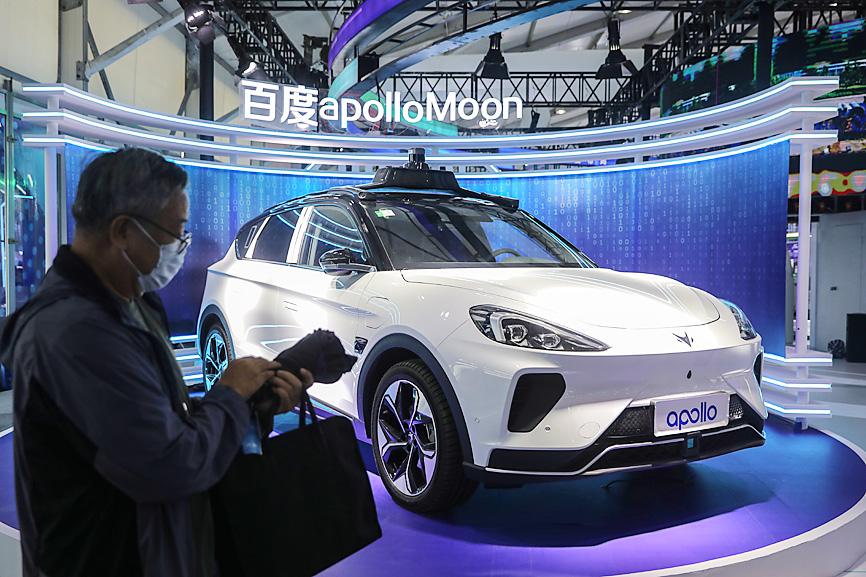Search giant Baidu Inc (百度) and Toyota Motor Corp-backed Pony.ai Inc (小馬智行) were granted the first batch of licenses from Beijing regulators to start open-road autonomous commercial driving operations in a part of the city equivalent to the size of Manhattan.
The pilot licenses will allow a fleet of about 100 cars from the two companies to travel around the 60km2 so-called Beijing High-level Automated Driving Demonstration Area, about a 30-minute drive from Tiananmen Square, state media reports said.
Baidu received 67 of the permits and will allow its robotaxis to range between more than 600 pickup and dropoff points from 7am and 10pm, it said in a statement yesterday.

Photo: EPA-EFE
The area includes commercial and residential precincts.
Pony.ai is to set up about 200 points in the zone, running from 8:30am to 10:30pm, the Guangzhou-based company said.
“Beijing, as the capital city and the first one to allow fare charging for robotaxi rides, will help companies accelerate autonomous vehicle deployment and test out and explore a business model,” BloombergNEF analyst Jinghong Lyu said. “It will also benefit industry players across the country as other local governments may follow Beijing.”
Beijing is one of the first places in the world to embark on such a concentrated trial of robotaxis in a commercial environment. Baidu and Pony.ai will be able to charge consumers for the rides, although detail around pricing and payment methods were not immediately available.
However, totally replacing drivers in China, where labor costs are low and the government has a keen interest in maintaining near full employment, would be tough, and not just from a business sense. The nation’s growing, but relatively inexperienced driving population makes for complex and often unpredictable traffic conditions, while varied road rules and street signs across provinces bring more challenges to the technology application.
“The issuing of the permits signifies that the development of autonomous driving in China has completed the testing stage to begin wider commercial exploration,” Baidu said.
Baidu is a leader in the research and deployment of autonomous driving in China, already the world’s biggest market for electric vehicles and car-sharing. It has teamed up with automakers like BAIC Motor Corp (北京汽車) and Zhejiang Geely Holding Group Co (吉利控股集團) to develop autonomous and electric vehicles, while expanding a nascent chip business beyond just in-house applications.
Founded in 2016, Pony.ai develops and operates self-driving fleets in the US and China, and has secured funding from Toyota and China FAW Group Co (中國一汽集團).

CHIP RACE: Three years of overbroad export controls drove foreign competitors to pursue their own AI chips, and ‘cost US taxpayers billions of dollars,’ Nvidia said China has figured out the US strategy for allowing it to buy Nvidia Corp’s H200s and is rejecting the artificial intelligence (AI) chip in favor of domestically developed semiconductors, White House AI adviser David Sacks said, citing news reports. US President Donald Trump on Monday said that he would allow shipments of Nvidia’s H200 chips to China, part of an administration effort backed by Sacks to challenge Chinese tech champions such as Huawei Technologies Co (華為) by bringing US competition to their home market. On Friday, Sacks signaled that he was uncertain about whether that approach would work. “They’re rejecting our chips,” Sacks

NATIONAL SECURITY: Intel’s testing of ACM tools despite US government control ‘highlights egregious gaps in US technology protection policies,’ a former official said Chipmaker Intel Corp has tested chipmaking tools this year from a toolmaker with deep roots in China and two overseas units that were targeted by US sanctions, according to two sources with direct knowledge of the matter. Intel, which fended off calls for its CEO’s resignation from US President Donald Trump in August over his alleged ties to China, got the tools from ACM Research Inc, a Fremont, California-based producer of chipmaking equipment. Two of ACM’s units, based in Shanghai and South Korea, were among a number of firms barred last year from receiving US technology over claims they have

BARRIERS: Gudeng’s chairman said it was unlikely that the US could replicate Taiwan’s science parks in Arizona, given its strict immigration policies and cultural differences Gudeng Precision Industrial Co (家登), which supplies wafer pods to the world’s major semiconductor firms, yesterday said it is in no rush to set up production in the US due to high costs. The company supplies its customers through a warehouse in Arizona jointly operated by TSS Holdings Ltd (德鑫控股), a joint holding of Gudeng and 17 Taiwanese firms in the semiconductor supply chain, including specialty plastic compounds producer Nytex Composites Co (耐特) and automated material handling system supplier Symtek Automation Asia Co (迅得). While the company has long been exploring the feasibility of setting up production in the US to address

OPTION: Uber said it could provide higher pay for batch trips, if incentives for batching is not removed entirely, as the latter would force it to pass on the costs to consumers Uber Technologies Inc yesterday warned that proposed restrictions on batching orders and minimum wages could prompt a NT$20 delivery fee increase in Taiwan, as lower efficiency would drive up costs. Uber CEO Dara Khosrowshahi made the remarks yesterday during his visit to Taiwan. He is on a multileg trip to the region, which includes stops in South Korea and Japan. His visit coincided the release last month of the Ministry of Labor’s draft bill on the delivery sector, which aims to safeguard delivery workers’ rights and improve their welfare. The ministry set the minimum pay for local food delivery drivers at